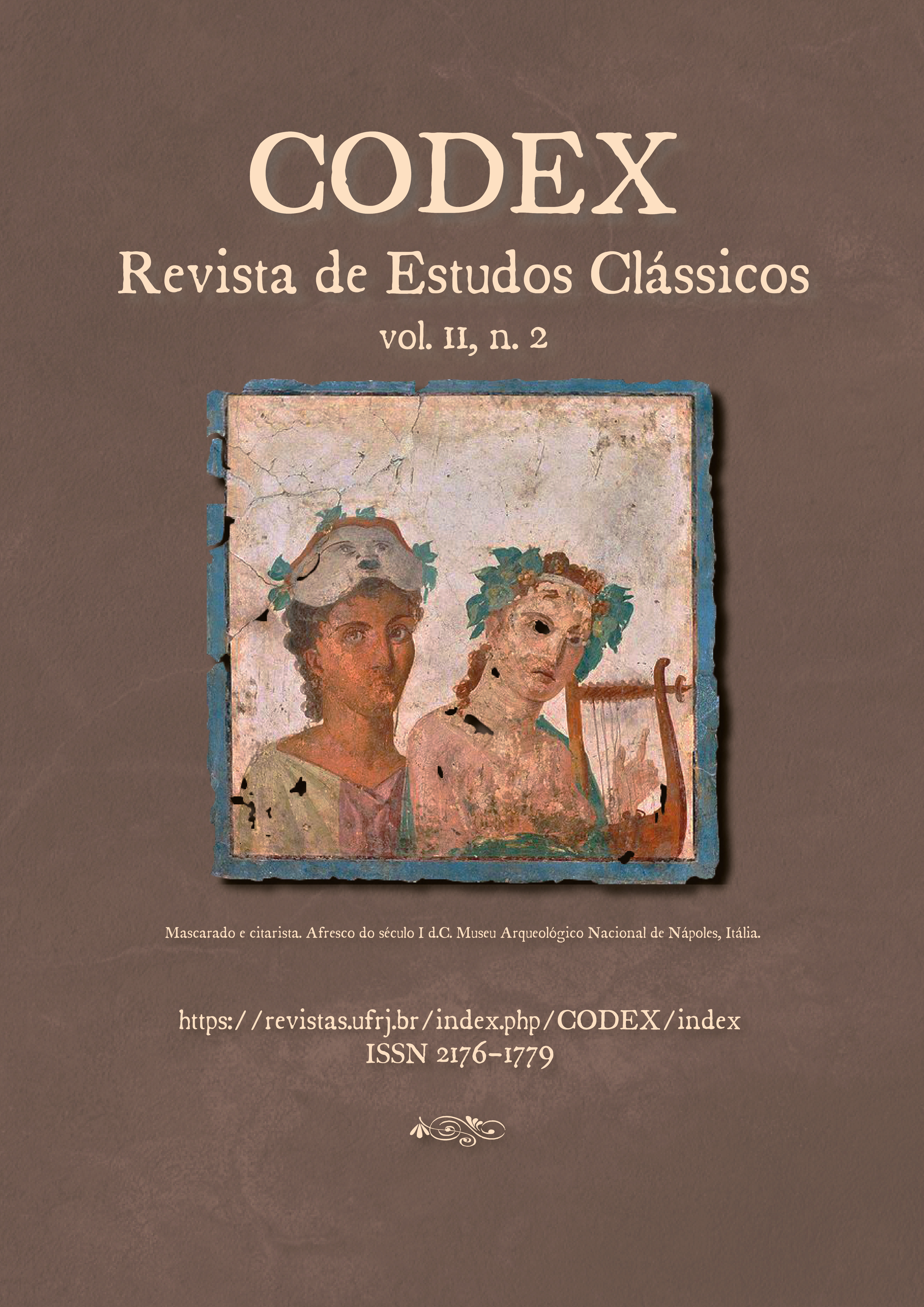A expressão de felicidade na comédia plautina
DOI:
https://doi.org/10.25187/codex.v11i2.62406Palavras-chave:
Plauto , Felicidade, Polidez positivaResumo
Neste artigo, intentamos analisar como a expressão de felicidade se mostra nas falas do drama plautino, em cenas variadas, como recurso que promove a manutenção da face positiva das personagens-tipo. Interessa-nos, sobretudo, analisar o uso plautino explícito de gaudere ora na assertiva empática de Sosia em Amphitruo (vv. 957-961), ora na saudação malsucedida entre os senes de Trinummus (v. 51-54), ora na comunicação in absentia de Dordalus para Toxilus em Persa (v. 501-502), dentre outros exemplos. Levando em consideração o contexto cênico e as perlocuções que provoca, concluímos que as funções desempenhadas por gaudere reduzem a distância social entre os interlocutores e aludem à comensalidade social e religiosa da Vrbs.
Downloads
Referências
ALLEN, J. The Roman Republic and the Hellenistic Mediterranean: From Alexander to Caesar. Nova Jersey: John Wiley & Sons, 2020.
AUSTIN, J. L. How to do things with words. Londres: Oxford University, 1962.
AUSTIN, J. L. Quando dizer é fazer: palavras e ação. Trad. Danilo Marcondes de Souza Filho. Porto Alegre: Artes médicas, 1990.
BROWN, P.; LEVINSON, S. C. Politeness: Some universals in language usage. Cambridge: Cambridge University, 1987.
CAFFI, C.; JANNEY, R. W. Toward a pragmatics of emotive communication. Journal of Pragmatics, 22 (3-4), pp. 325-373, 1994.
DUCKWORTH, G. E. The nature of Roman Comedy. Princeton: Princeton University, 1952.
DUMÉZIL, Georges. La religion romaine archaïque: avec un appendice sur la religion des Etrusques. Paris: Payot, 1974.
ENNIUS, Q. The Annals. Ed. O. Skutsch. Oxford: Clarendon, 1985.
FANTUZZI, Marco; HUNTER, R. L. Tradition and Innovation in Hellenistic Poetry. Cambridge: Cambridge University, 2004.
FOWLER, W. W. The Religious Experience of the Roman People. Londres: Macmillan and Co., 1911.
FRAENKEL, Eduard. Plautine Elements in Plautus. Trad. DREVIKOVISK, Tomas; MUECKE, Frances. Oxford: Oxford University, 2007.
GÓMEZ, L. U. “Expressing happiness as a manifestation of positive politeness in Roman comedy”. In: van Gils, L.; Kroon, C.; Risselada, R. (ed) Lemmata Linguistica Latina, 2019.
HANSON, J. A. Plautus and Roman religion. Baltimore: John Hopkins University, 1959.
HUNTER, R. L. The New Comedy of Greece and Rome. Cambridge: Cambridge University, 1985.
LEECH, G. The pragmatics of politeness. Oxford: Oxford University, 2014.
LÓPEZ, M. L. “Nueva propuesta de cronología de las comedias de Plauto”. Florentia Iliberritana. Vol. 18. Granada: Universidad de Granada, 2007, pp. 203-235.
LOWE, Christy. The Use of Colloquial Language in the Portrayal of the Gods in Plautus’ Amphitryon (341-632). Birgmingham: Rosetta, 2015.
MANUWALD, Gesine. Roman republican theatre. Nova York: Cambridge University, 2011.
MOORE, T. J. Music, and Structure in Roman Comedy. Baltimore: The Johns Hopkins University, 1998, p. 245-73.
PLAUTUS, Titus Maccius. Plauti Comoediae. Ed. Fredericus Leo. Berlim: Weidmann, 1896.
RISSELADA, Rodie. Imperatives and other directive expressions in Latin: a study in pragmatics of a dead language. Amsterdã: JC Biegen, 1993.
ROSIVACH, V. J. Rudens and the power of discourse in The classical world. Baltimore: Johns Hopkins University, 2000, pp. 261-265.
SEARLE, J. R. Expression and meaning: Studies in the theory of Speech Acts. Cambridge: Cambridge University, 1979.
Taylor, Lily Ross. “The Opportunities for Dramatic Performances in the Time of Plautus and Terence”. Transactions and Proceedings of the American Philological Association, Vol. 68 (1937), pp. 284-304.
TOLIVER, H. M. The “fabulae palliatae” and the spread of the Hellenis. The Classical Journal, Vol. 49, No. 7. CAMWS, 1954, pp. 303-306.
WILKINS, J.M.; HILL, Shaun. Food in the Ancient world. Oxford: Blackwell, 2006.
Downloads
Publicado
Como Citar
Edição
Seção
Licença
Copyright (c) 2024 Fellipe Duarte da Silva Alves de Souza

Este trabalho está licenciado sob uma licença Creative Commons Attribution-NonCommercial 4.0 International License.
A Codex - Revista de Estudos Clássicos utiliza uma licença Creative Commons - Atribuição-NãoComercial 4.0 Internacional.
Os autores dos trabalhos aprovados autorizam a revista a, após a publicação, ceder seu conteúdo para reprodução em indexadores de conteúdo, bibliotecas virtuais e similares.
A revista se permite o uso dos trabalhos publicados para fins não comerciais, incluindo o direito de enviar o trabalho para bases de dados de acesso público.










